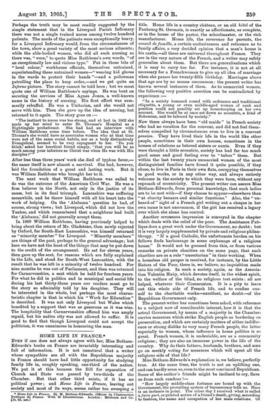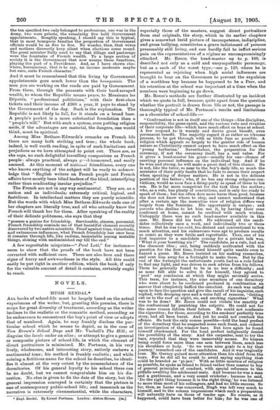EVEN if one does not always agree with her, Miss
Betham- Edwards's books on France are invariably interesting and full of information. It is not unnatural that a writer whose sympathies are all with the Republican majority in France should have had little opportunity for studying family life in, roughly speaking, one-third of the nation. .We put it at this because the Bill for separation of Church and State was passed by two-thirds of the Chamber. But that other third exists, if it has no political power ; and Home Life in France, leaving out society and most of its ways, seems rather too .sweeping a • Home Life in Francs. By X. Betham-Edwards, Officier de 'Instruction Publique de France. With 20 Illustrations. London : Methuen and Co. eis. 6d. net.1 title. Home life in a country chateau, or an old hotel of the Faubourg St. Germain, is exactly as affectionate, as complete,
as in the house of the pastor, the schoolmaster, or the rich manufacturer. Home life, the reverence for parents, the conseil de famine, a certain exclusiveness and reticence as to family affairs, a very decided opinion that a man's house is his castle,—all these are universal throughout France. They are in the very nature of the French, and a writer may safely generalise about them. But there are generalisations which it is easy to carry too far. For instance, it is not at all necessary for a Frenchwoman to give up all idea of marriage when she passes her twenty-fifth birthday. Marriages above that age are by no means uncommon : the present writer has known several instances of them. As to unmarried women, the following very positive assertion can be contradicted by experience :—
"In a society hemmed round with ordinance and traditional etiquette, a young or even middle-aged woman of rank and position could not possibly set up housekeeping on her own account. She would be at once set down as eccentric, a kind of Bohemian, and be tabooed by society."
Now there always have been "old maids" in French society who had no vocation for the convent, and did not feel them- selves compelled by circumstances even to live in a convent pension. They have lived their life in the world like other people, sometimes in their own houses, sometimes in the houses of relations as beloved sisters or aunts. Even if they were thought a little eccentric, society has had far too much good sense and good feeling ever to " taboo " them. But within the last twenty years unmarried women of the most distinguished families have found it quite possible, if they chose, to live in Paris in their own flats, occupying themselves in good works, or in any other way, and always entirely welcome in the society to which they were born, without any reproach of eccentricity. The present writer can assure Miss Betham-Edwards, from personal knowledge, that such ladies are to be met with—if they choose to appear—elsewhere than "at charity bazaars and similar functions." Also, the " un- heard-of " sight of a French girl writing out a cheque in her own name is not uncommon, if the girl has received a legacy over which she alone has control.
Another erroneous impression is conveyed in the chapter which deals with the relief of the poor. The Assistance Pub. lique does a great work under the Government, no doubt ; but it is very largely supplemented by private and religious philan- thropy. "If a good Catholic, the unfortunate burden on his fellows finds harbourage in some orphanage of a religious house." It would not be guessed from this, or from various remarks on private charities on the same page, that such charities are as a rule " uusectarian " in their working. When a homeless old pauper is received, for instance, by the Little Sisters of the Poor, there is, we believe, no inquisition made into his religion. In such a society, again, as the Associa- tion Valentin Haiiy, which devotes itself, in the widest spirit, to the welfare of the blind, no religious test exists : all are helped, whatever their Communion. It is a pity to leave out this whole side of French life, and to confine one- self to the charitable works—excellent, no doubt—of the Republican Government only.
The present writer has sometimes been asked, with reference to a subject now of considerable interest, how it is that the actual Government, by means of a majority in the Chamber, carries measures which strike English people as bordering on persecution, and which are certainly matters of either indiffer- ence or strong dislike to very many French people, the latter especially to women, whose influence in home politics is so great. French women, it is undeniable, are as a community religious ; they are also an immense power in the life of the country. Why do their fathers, husbands, brothers, and sons go on meekly voting for measures which will upset all the religious side of that life ?
Miss Betham-Edwards's explanation is, we believe, perfectly true. At the same time, the truth is not an uplifting one,
and can hardly seem so, even to the most convinced Republican. Some of the author's friends might be inclined to cry, Save us from such candour !—
" How largely middle-class fortunes are bound up with the Government, the prevailing system of bureaucracy tells us. Here is an instance in point. The other day I received what is called a faire part, or printed notice of a friend's death, giving, according to fashion, the name and occupation of her male relations. Of
the ten specified two only belonged to professions, one was in the Army, two were priests, the remaining five held Government appointments. Roughly speaking, I should say this is typical, that in most bourgeois families the proportion of Government officials would be as five to five. No wonder, then, that wives and mothers discreetly keep silent when elections come round. The great minister Sully used to say that tillage and pasturage were the fountains of French wealth. To a large section of society it is the Government that now usurps these functions, playing the part of a Providence. And, as I have shown else- where, bureaucracy, that is to say, an income moderate maybe but sure, suits French character."
And it must be remembered that this living by Government appointments goes much lower than the bourgeoisie. The men you see working on the roads are paid by Government. From them, through the peasants with their hard-scraped wealth, to whom the Republic means peace, to Messieurs les Deputes, "professional politicians," with their first-class tickets and their income of £360 a year, it pays to stand by the Government of the day. Such is the explanation. The Republic is not likely to fall, for it stands on a broad base.
A people's pocket is a more substantial foundation than a "people's will." But with such a system, even putting religion aside, if the advantages are material, the dangers, one would think, must be spiritual.
Among Miss Betham-Edwards's remarks on French life there are many both striking and true ; the whole book, indeed, is well worth reading, in spite of such limitations and prejudices as we have attempted to point out. There are, as she says, no such delightful travelling companions as French
people : always practical, always gond-humoured, and easily amused. At this moment of national friendliness, every one
who knows anything of the subject will be ready to acknow- ledge that "English writers on French people and French affairs have mostly been blind leaders of the blind, intensifying -rather than eradicating insular prejudice."
The French are not in any way sentimental. They are, as a nation and as individuals; extremely critical, logical, and fastidious. In intellectual matters they are purely scientific. But the words with which Miss Betham-Edwards ends one of her chapters are literally true, and all who actually know the French will thank her for them. After speaking of the reality of their delicate politeness, she says that they
"possess a genius for friendship. Serviceable, sincere, perennial, French friendship reminds me of that beautiful element recently discovered by two native scientists. Proof against time, vicissitude, and extraneous influences, what French friendship has once been it remains through life, like radium, immutable among mutable things, shining with undiminished ray till the end."
A few regrettable misprints—" Paul Loti," for instance— seem to show that the proofs of the book have not been
corrected with sufficient care. There are also here and there signs of hurry and awkwardness in the style. All this could easily be put right in another edition, which the book, if only for the valuable amount of detail it contains, certainly ought to reach.



































 Previous page
Previous page